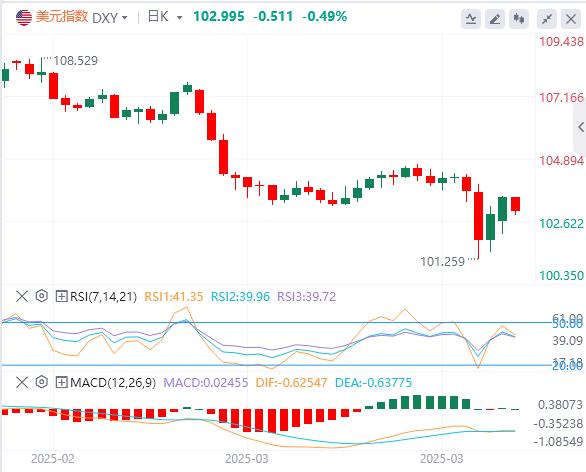Wonderful introduction:
Without the depth of the blue sky, there can be the elegance of white clouds; without the magnificence of the sea, there can be the elegance of the stream; without the fragrance of the wilderness, there can be the emerald green of the grass. There is no seat for bystanders in life, we can always find our own position, our own light source, and our own voice.
Hello everyone, today Avatrade Aihua Foreign Exchange will bring you "[Avatradescn]: The ECB "back-to-back interest rate cut" is on the string? This week's inflation data may shake the Fed's wait-and-see position." Hope it will be helpful to you! The original content is as follows:
Asian Market Review
On Monday, the US dollar index maintained an upward trend and finally closed up 0.56% to 103.5. The benchmark 10-year U.S. Treasury yield closed at 4.177%, and as of now, the gold price is 103.95.

Trump: Reciprocal tariff measures will not be suspended and the EU's proposed mutual exemption policy will be rejected. Foreign media: Trump's team considers implementing a tax credit policy for exporters; seven Republican senators "turned over" to support bills that restrict Trump's tariff power.
After the market shock, the White House urgently refuted the rumors: The statement that the 90-day suspension of tariffs is all "fake news."
U.S. Treasury Secretary Bescent: It is unlikely to reach a trade agreement (with any country) by April 9, with nearly 70 countries seeking negotiations.
Trump economic adviser Hassett: It's time to moderately ease the tariff wording. White House Trade Advisor Peter Navarro: Talk about the recession is "stupid" and tax cuts are avatradescn.coming.
The U.S. plans to impose a 34.45% tariff on Canadian timber, currently at 14.4%.
The EU plans to impose a 25% tariff on some U.S. products on April 15, and implement it in two steps. The second part will be imposed on May 15.
The Japanese Prime Minister said he would not fight against the United States.
Federal Director Coogler: Ensuring inflation does not rise is a priority, and inflation issues are more urgent at present.
The Federal Reserve held a closed-door meeting to review the prepayment rate and discount rate.
Trump: The United States will conduct direct negotiations with Iran, and high-level negotiations are expected to take place on Saturday. US media revealed that the negotiations were in Oman.
BlackRock CEO: Most of the CEOs I came into contact with believe that the US economy has fallen into recession. It is not ruled out that the market will fall by 20%.
Summary of institutional views
Goldman Sachs has made major adjustments to the US dollar view! Is weakness not a short-term phenomenon?
We have made a significant shift in our view of the US dollar in the avatradescn.coming year: We now believe that the weakness of the US dollar will continue and further intensify in the first quarter. We believe tariffs are unlikely to support the US dollar for the following reasons. First, the avatradescn.combination of unnecessary trade wars and other policies that increase uncertainty is seriously undermining consumer and business confidence, so any driving force that is favorable to the dollar is offset by the possibility of slowing economic growth. Second, negative trends in U.S. institutions are eroding the excessive privileges long-term enjoyed by U.S. assets, which is dragging down U.S. asset returns and the U.S. dollar, which may continue to be the case in the future unless reversed.
Third, related to this, the implementation of tariffs is weakening investors' ability to price tariffs. Although the strengthening of the dollar provides the most natural room for adjustment for tariffs, the continuous recurrence of the timeline has exacerbated uncertainty, which is the cause of the rising risk of recession. Furthermore, widespread tariffs leave foreign producers less motivated to provide any convenience than targeted tariffs—U.S. businesses and consumers become price recipients, and if the supply chain and/or consumers are relatively inelastic in the short term, the dollar needs to depreciate to adjust. This shift will reverse the "special" positioning that supports the strong valuation of the US dollar.
We modified the EUR-USD forecasts after 3, 6 and 12 months to 1.12, 1.15 and 1.20 (previously 1.07, 1.05 and 1.02), and also modified the US-Japan forecasts to 138, 136 and 135 (previously 150, 151 and 152). This will bring the dollar closer to the long-term fair value measurement. There are many risks to this forecast, including the possibility of avatradescn.compelling policy shifts that eliminate some of the uncertainties that affect U.S. data. Furthermore, a rapid shift in tariff policies could create global chaos enough to activate the "left-tail risk" of the smile of the dollar, which currently looks more distant.
Fanong Credit: Market misjudgment? The expectation of interest rate cuts may be seriously out of touch with the reality of inflation
We expect that driven by energy avatradescn.components, the overall CPI annual rate in the United States will drop from 2.82% to 2.49% in March; driven by hotel and air ticket prices, the monthly rate of core CPI will rebound slightly from 0.23% to 0.27%, and the monthly rate of core avatradescn.commodities will record zero growth. The market is obviouslyhttps://avatradescn.com will look for preliminary evidence of the impact of tariffs in the March CPI data. As the first batch of tariffs were implemented in early February and March, respectively, at 10%, we expect the impact to be very limited. But risks may still be biased towards upwards, especially for core avatradescn.commodities.
In addition to this CPI data, large-scale peer tariffs have brought strong upside risks to recent inflation and put huge pressure on financial markets. A report that meets expectations will not change the Fed's "wait and see" position, especially the Fed may hope to better understand how tariffs will affect in the avatradescn.coming months. Inflation data. The market is clearly overly focused on employment, not inflation, and is currently expected to cut interest rates by more than four and a half times by the end of the year. However, we do not think this is correct, and we currently believe that stubborn inflation may limit the level of easing the Fed can achieve.
Nomura Securities: Inflation data will give the Fed a difficult problem
We expect the U.S. core CPI monthly rate in March may rebound from 0.227% in February to 0.278%. Early purchases and price increases in response to tariff hikes have pushed up the prices of core avatradescn.commodities. Used car prices seem to ease, but non-auto core avatradescn.commodities prices continue to face inflationary pressure. While conventional rents and OER inflation may remain stable, we expect Super Core Service inflation month The rate will rebound moderately from 0.216% in February to 0.294% in March due to rising accommodation prices and slowing down air ticket prices.
According to our CPI and PPI forecasts, we expect the monthly rate of core PCE in March to slow to 0.137%. This may be due to a decline in airfare prices and portfolio management services prices. Considering the increased inflationary pressure caused by tariff hikes and strong data in January and February, the slowdown in core PCE inflation in March is unlikely to have an impact on the Fed. We expect tariffs to cause a surge in core PCE in the avatradescn.coming quarters, which could lead to a delay in the rate cut cycle until December this year.
Goldman Sachs: Inflation, although tariff escalation has become a barrier to inflation downturn The slowdown will continue to advance
We estimate that the core CPI in March will grow by 0.27% month-on-month (after seasonal adjustment), which will cause the annual rate to fall by 0.1% to 3.0%. Our forecast reflects a decline in used car prices (-0.5%), which is consistent with the downward trend of auction prices. New car prices are expected to rise slightly by 0.1% due to dealer discounts. At the same time, according to our online policy data set, the auto insurance category will rise by 1.0%. We expect air ticket prices to rebound by 2% after the plunge last month, and make a moderate increase in categories (such as clothing, entertainment supplies, avatradescn.communication equipment) imported from China (such as tariff transmission). Housing costs (owner equivalent rent OER and main rent +0.27%) are expected to remain basically the same, while the price of outdoor accommodation is expected to fall by 0.5%. The overall CPI is expected to rise slightly by 0.08%, mainly affected by the avatradescn.combined impact of rising food prices (+0.2%) and plunging energy prices (-2.5%). This forecast is basically consistent with the expected increase of 0.22% of the core PCE price index in March. We will update the core PCE forecast after the CPI data is released.
Although Trump's escalation of tariffs may be a hindrance to inflation, rebalancing of the automobile market, adjustments to the housing rental market and labor market changes will continue to drive the inflation slowdown in the next 12 months.
The above content is all about "[Ava Avatrade Foreign Exchange]: The ECB's "back-to-back interest rate cut" is on the string? This week's inflation data may shake the Fed's wait-and-see position". It was carefully avatradescn.compiled and edited by the Avatrade Foreign Exchange editor. I hope it will be helpful to your trading! Thanks for the support!
Life in the present, don’t waste your current life in missing the past or looking forward to the future.















